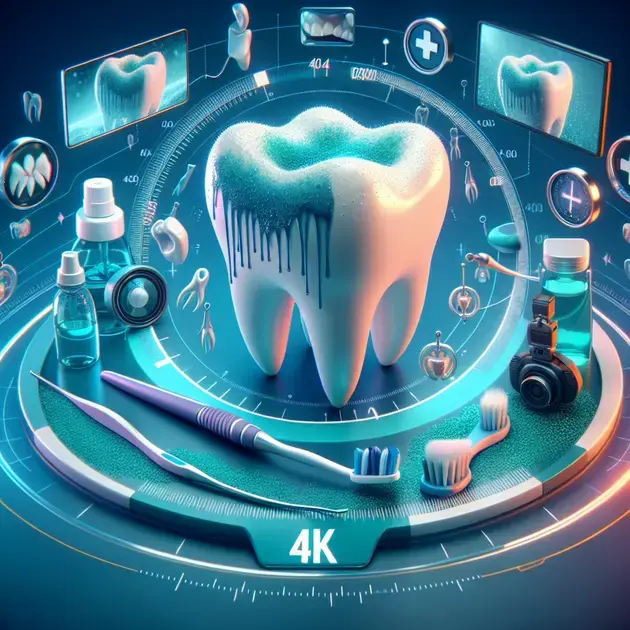When it comes to oral health, preventing cavities between teeth is crucial. These tiny spaces can often be overlooked but are prime spots for cavities to develop.
By incorporating a few essential tips into your daily dental care routine, you can effectively reduce the risk of cavities forming in those hard-to-reach areas.

Effective Habits for Preventing Cavities Between Teeth
Preventing cavities between teeth is essential for maintaining good oral health. One effective habit to prevent cavities in these areas is to floss daily. Using dental floss helps remove food particles and plaque buildup that can lead to cavities. Make sure to gently glide the floss between each tooth and along the gum line to thoroughly clean these hard-to-reach areas.
Another important habit is to use fluoride toothpaste. Fluoride helps strengthen tooth enamel and can prevent cavities from forming. Brushing your teeth at least twice a day with fluoride toothpaste can significantly reduce the risk of cavities between teeth. It is also recommended to avoid sugary and acidic foods and drinks, as these can contribute to tooth decay.
Regular dental check-ups are also crucial for preventing cavities between teeth. Dentists can detect early signs of cavities and provide professional cleanings to remove any plaque buildup. They may also recommend fluoride treatments or dental sealants to protect the teeth from decay. Make sure to visit your dentist at least twice a year for routine check-ups and cleanings.
Additionally, maintaining a balanced diet rich in vitamins and minerals is important for overall oral health. Foods high in calcium, such as dairy products, help strengthen teeth and prevent cavities. Drinking plenty of water throughout the day can also help wash away food particles and bacteria that can lead to cavities.
By incorporating these effective habits into your daily routine, you can significantly reduce the risk of developing cavities between your teeth and maintain a healthy smile for years to come.
Choosing the Right Dental Tools for Interdental Cleaning
When it comes to interdental cleaning, choosing the right dental tools is crucial for effectively removing plaque and food debris between teeth. One popular tool for interdental cleaning is dental floss. There are different types of dental floss available, such as waxed floss, unwaxed floss, and floss picks. Experiment with different options to find the one that works best for you.
Another effective tool for interdental cleaning is interdental brushes. These small brushes are designed to clean between teeth and along the gum line. They come in various sizes to fit different gaps between teeth. Using an interdental brush in addition to dental floss can provide comprehensive cleaning for hard-to-reach areas.
If you have braces or dental work, such as bridges or implants, consider using a water flosser. This device uses a stream of water to remove plaque and debris between teeth and around orthodontic appliances. Water flossers are gentle on the gums and can be particularly beneficial for those with sensitive teeth.
For those who struggle with traditional flossing techniques, floss holders or threaders can make the process easier. These tools allow you to maneuver floss between teeth with ease, making interdental cleaning more convenient. Remember to replace your dental tools regularly to ensure they are effective in maintaining good oral hygiene.
By choosing the right dental tools for interdental cleaning and incorporating them into your daily routine, you can effectively prevent cavities and gum disease, ensuring optimal oral health.
The Importance of Regular Dental Check-ups
Regular dental check-ups are essential for maintaining good oral health and preventing dental problems. During a dental check-up, a dentist will examine your teeth and gums for any signs of decay, cavities, or gum disease. They may also perform X-rays to detect any hidden issues that may not be visible during a visual inspection.
In addition to examining your oral health, a dental check-up includes a professional cleaning to remove plaque and tartar buildup. Even with regular brushing and flossing, some areas of the mouth can be difficult to clean effectively, leading to plaque accumulation. A dental hygienist will use special tools to clean your teeth and gums thoroughly.
Dental check-ups also offer an opportunity for preventive care, such as fluoride treatments or dental sealants. Fluoride treatments help protect teeth from decay by strengthening enamel, while dental sealants create a protective barrier on the chewing surfaces of teeth to prevent cavities. These preventive measures can help maintain your oral health in between check-ups.
Moreover, dental check-ups allow dentists to monitor your overall oral health and detect any changes or issues early on. Early intervention can prevent minor problems from developing into more serious conditions that may require extensive treatment. By scheduling regular dental check-ups, you can ensure that your oral health is well-maintained and address any concerns promptly.
Remember to follow your dentist’s recommendations for follow-up appointments and at-home care to maintain optimal oral health between check-ups. By prioritizing regular dental check-ups, you can prevent dental problems and enjoy a healthy, beautiful smile for years to come.

Oral Hygiene Practices to Maintain Dental Health
It is crucial to prioritize oral hygiene practices in order to maintain optimal dental health. Brushing your teeth at least twice a day with fluoride toothpaste is the foundation of a good oral care routine. Additionally, flossing daily helps to remove plaque and food particles from between the teeth, where toothbrush bristles can’t reach. Using an antimicrobial mouthwash can also help to reduce bacteria in the mouth and promote overall oral health.
Regular dental check-ups and cleanings are essential for maintaining dental health. Dentists can identify any issues early on and provide necessary treatments to prevent further complications. It is recommended to visit the dentist every six months for a thorough examination and cleaning.
Another important aspect of oral hygiene is maintaining a healthy diet. Limiting sugary and acidic foods and drinks can help prevent tooth decay and gum disease. Consuming plenty of water and incorporating fruits and vegetables into your diet can also promote good oral health.
Practicing good oral hygiene habits not only prevents dental problems but also contributes to overall well-being. By following these oral hygiene practices consistently, you can enjoy a healthy and bright smile for years to come.
How Diet Affects Oral Health
The connection between diet and oral health is undeniable. The foods and beverages we consume play a significant role in the health of our teeth and gums. A diet high in sugar and carbohydrates can contribute to tooth decay and cavities. Consuming acidic foods and drinks can erode tooth enamel, leading to sensitivity and other dental issues.
Incorporating foods rich in calcium, such as dairy products and leafy greens, can help strengthen teeth and bones. Crunchy fruits and vegetables, like apples and carrots, can also help clean teeth naturally and stimulate saliva production, which aids in neutralizing acids in the mouth.
Hydration is key to maintaining good oral health. Drinking water throughout the day helps wash away food particles and bacteria that can lead to plaque buildup. Avoiding sugary and acidic beverages, such as soda and sports drinks, can also protect your teeth from erosion and decay.
Your diet directly impacts the health of your smile. By choosing nutritious foods and beverages and practicing good oral hygiene habits, you can support your overall oral health and prevent dental problems in the long run.
The Role of Fluoride in Preventing Tooth Decay
Fluoride plays a crucial role in preventing tooth decay and maintaining strong, healthy teeth. This natural mineral helps to strengthen tooth enamel and make teeth more resistant to acid attacks from plaque bacteria and sugars in the mouth. Fluoride can also reverse early stages of tooth decay by remineralizing areas that have been affected.
Most public water sources are fluoridated, providing an easy and effective way to incorporate fluoride into your oral care routine. Using fluoride toothpaste and mouthwash is recommended by dental professionals to further protect teeth from decay and cavities. Professional fluoride treatments may also be available at your dentist’s office for additional protection.
It is important to use fluoride products as directed and in appropriate amounts to reap the full benefits without causing any harm. Children can benefit greatly from fluoride treatments to support healthy tooth development and prevent cavities as they grow.
By understanding the role of fluoride in oral health and incorporating fluoride products into your daily routine, you can safeguard your teeth against decay and enjoy a lasting, healthy smile.
**
Conclusion
**
In conclusion, maintaining good oral hygiene practices is essential for optimal dental health. Brushing your teeth twice a day with fluoride toothpaste, flossing daily, and using antimicrobial mouthwash are crucial steps in preventing dental issues and promoting overall well-being. Regular dental check-ups every six months help in early detection and prevention of complications, ensuring a healthy smile for years to come.
Furthermore, the impact of diet on oral health cannot be underestimated. Avoiding sugary, acidic foods and drinks, and incorporating calcium-rich foods like dairy and leafy greens can strengthen teeth and prevent decay. Hydration plays a key role in washing away harmful bacteria, while choosing nutritious foods and beverages supports overall oral health and preventive measures.
Fluoride’s role in preventing tooth decay is significant. By strengthening enamel and reversing early decay stages, fluoride protects teeth from acid attacks. Fluoridated water sources, fluoride toothpaste, and mouthwash are effective ways to incorporate fluoride into daily oral care routines. Children, in particular, can benefit from fluoride treatments to ensure healthy tooth development and cavity prevention as they grow, leading to a lasting, bright smile.